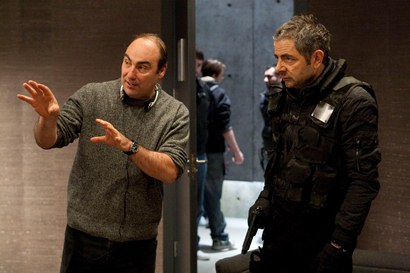
BS8909 is the standard for sustainability management in the UK film industry, which takes into account the social, financial and economic impact of a movie, and looks at ways to reduce it. But what does it mean for directors? And how can they play their part in ensuring their productions meet the standard?
We spoke to Oliver Parker, who worked with environmental consultants Greenshoot on his last film Johnny English Reborn, to find out…
Directors UK: How did you come to work with Greenshoot on Johnny English Reborn?
Oliver Parker: Universal had already set up certain Green initiatives and Greenshoot had spent some time negotiating with both Working Title and Universal by the time I came on board.
D-UK: What was the biggest surprise about how to make a film sustainable that you learnt from working with them?
OP: The biggest surprise is that none of the schemes add up to much unless you can change the mindset of the people involved. So the key is educating everyone in production- getting the crew to understand the difference they can make and getting them onside. These are smart, inventive characters who are working under pressures of time and money, so it’s vital they see the merits of this and how they can best use their abilities to contribute.
D-UK: Can you share any cheap or simple tips about how filmmakers can make their shoots greener?
OP: Stop using plastic bottles would help. Not only does it cost money to buy them, it costs a fortune to dispose of them. Eco transport makes a real difference, and again can be less expensive than some of the well-known brands.
D-UK: To what extent do you think directors have a responsibility to ensure their productions are sustainable ones?
OP: I think we have a massive responsibility here. I don’t think I fully comprehended it on Johnny English. It was something of a trial run for Greenshoot and it wasn’t until afterwards that I began to appreciate the extent of the problem, and of the solutions. I think next time I would like to me more involved in addressing the issues and encouraging my team to take part; to engage them during the initial stages of prep, so everyone knows the buy in from the first day.
D-UK: There is an assumption that making allowances for sustainability on a film set is time-consuming, and therefore expensive. What was your experience?
OP: Film-making is a tough nut to crack environmentally. We are an itinerant bunch, facing different challenges in different places. All delays are dangerous and budgets are always tight. This means that crews aren’t always going to be open to the idea of sustainability. What impressed me about Greenshoot was I hardly noticed them. They were extremely film-friendly and very sensitive to our practices. What’s interesting is, while they go about their business- scrutinising all the elements of energy, transport and catering - they’re coming up with ways that actively reduce some of our expenses. They’re tracking waste ‘from cradle to grave’, disposing of it more efficiently and cheaply, and sourcing better deals on our behalf.
D-UK: What one thing made the biggest difference in improving the environmental impact of Johnny English Reborn?
OP: We banned polystyrene. We were the first UK film to adopt a full sustainability programme, and we composted all our food. The Greenshoot steward was able to support all departments in their efforts to make small changes that had a larger impact on reducing the production’s footprint.
D-UK: Finally, would you say that working with Greenshoot has changed your approach to filmmaking in the future, and if so, how?
OP: Filmmaking is a surreal business. We are so committed to getting that story told, that sometimes it can feel like ‘normal rules don’t apply’. On Johnny English we had a Greenshoot steward on board every day who was allocated the job of supporting all departments in making sure we had a more environmentally friendly production. The experience opened my eyes to the shocking scale of our ‘footprint’ and how important it is we use our resources responsibly. The filmmaking stays the same.
Find out more about BS8909 here.






Have Your Say
Join the discussion on Facebook